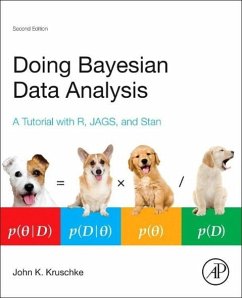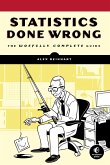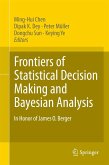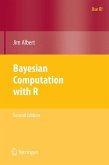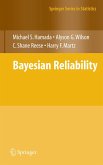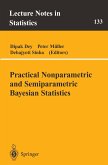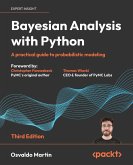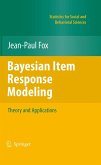Doing Bayesian Data Analysis: A Tutorial with R, JAGS, and Stan, Second Edition provides an accessible approach for conducting Bayesian data analysis, as material is explained clearly with concrete examples. Included are step-by-step instructions on how to carry out Bayesian data analyses in the popular and free software R and WinBugs, as well as new programs in JAGS and Stan. The new programs are designed to be much easier to use than the scripts in the first edition. In particular, there are now compact high-level scripts that make it easy to run the programs on your own data sets.
The book is divided into three parts and begins with the basics: models, probability, Bayes' rule, and the R programming language. The discussion then moves to the fundamentals applied to inferring a binomial probability, before concluding with chapters on the generalized linear model. Topics include metric-predicted variable on one or two groups; metric-predicted variable with one metric predictor; metric-predicted variable with multiple metric predictors; metric-predicted variable with one nominal predictor; and metric-predicted variable with multiple nominal predictors. The exercises found in the text have explicit purposes and guidelines for accomplishment.
This book is intended for first-year graduate students or advanced undergraduates in statistics, data analysis, psychology, cognitive science, social sciences, clinical sciences, and consumer sciences in business.
The book is divided into three parts and begins with the basics: models, probability, Bayes' rule, and the R programming language. The discussion then moves to the fundamentals applied to inferring a binomial probability, before concluding with chapters on the generalized linear model. Topics include metric-predicted variable on one or two groups; metric-predicted variable with one metric predictor; metric-predicted variable with multiple metric predictors; metric-predicted variable with one nominal predictor; and metric-predicted variable with multiple nominal predictors. The exercises found in the text have explicit purposes and guidelines for accomplishment.
This book is intended for first-year graduate students or advanced undergraduates in statistics, data analysis, psychology, cognitive science, social sciences, clinical sciences, and consumer sciences in business.
"Both textbook and practical guide, this work is an accessible account of Bayesian data analysis starting from the basics.This edition is truly an expanded work and includes all new programs in JAGS and Stan designed to be easier to use than the scripts of the first edition, including when running the programs on your own data sets." --MAA Reviews
"fills a gaping hole in what is currently available, and will serve to create its own market" --Prof. Michael Lee, U. of Cal., Irvine; pres. Society for Mathematical Psych
"has the potential to change the way most cognitive scientists and experimental psychologists approach the planning and analysis of their experiments" --Prof. Geoffrey Iverson, U. of Cal., Irvine; past pres. Society for Mathematical Psych.
"better than others for reasons stylistic.... buy it -- it's truly amazin'!" --James L. (Jay) McClelland, Lucie Stern Prof. & Chair, Dept. of Psych., Stanford U.
"the best introductory textbook on Bayesian MCMC techniques" --J. of Mathematical Psych.
"potential to change the methodological toolbox of a new generation of social scientists" --J. of Economic Psych.
"revolutionary" --British J. of Mathematical and Statistical Psych.
"writing for real people with real data. From the very first chapter, the engaging writing style will get readers excited about this topic" --PsycCritiques
"fills a gaping hole in what is currently available, and will serve to create its own market" --Prof. Michael Lee, U. of Cal., Irvine; pres. Society for Mathematical Psych
"has the potential to change the way most cognitive scientists and experimental psychologists approach the planning and analysis of their experiments" --Prof. Geoffrey Iverson, U. of Cal., Irvine; past pres. Society for Mathematical Psych.
"better than others for reasons stylistic.... buy it -- it's truly amazin'!" --James L. (Jay) McClelland, Lucie Stern Prof. & Chair, Dept. of Psych., Stanford U.
"the best introductory textbook on Bayesian MCMC techniques" --J. of Mathematical Psych.
"potential to change the methodological toolbox of a new generation of social scientists" --J. of Economic Psych.
"revolutionary" --British J. of Mathematical and Statistical Psych.
"writing for real people with real data. From the very first chapter, the engaging writing style will get readers excited about this topic" --PsycCritiques

